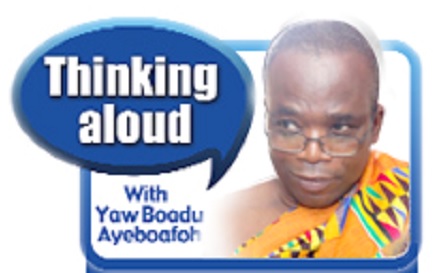
Scholarship in mother tongue
As a country, we have seen what decentralised radio can do with the proliferation of FM stations and the use of Ghanaian languages.
Callers are readily able to make contributions to programmes by phone with the use of Ghanaian languages, underlying the fact that intelligence cannot be equated to the English Language, as we have been mischievously manipulated to assume. But language lies at the heart of culture and defines us as a people.
But the absence of a conscious effort to teach and learn from our mother tongues is reflected in some of the miseducated use of our mother tongues, creating confusion over the airwaves in undignified expressions.
Most people do literal translations from English to their mother tongues and thus expose their lack of depth in the mother tongue, which the colonial power deliberately described as Native, whilst they would never describe English as native in England.
There are many of our chiefs, the custodians of our cultures who define and serve as watchdogs of our customs, mores and practices, who cannot express themselves comprehensively in the mother tongues without introducing English expressions, mainly idioms, even when better and deeper idioms exist in the mother tongue that could have brought better clarity and certainty to their speeches.
When I started school in 1963 at Wenchi, in the Offinso South District, written at every vantage point around the school compound was " Speak English, no vernacular", with the còcomitant reality that those who even accidentally broke the rule were punished punitively to put the fear of God into pupils never to joke with Her Majesty's language.
Last December, I was invited as the guest of honour at a function at the school, and the same odd, dysfunctional prohibition of Ghanaian languages was written all over the walls: " Speak English, No Vernacular".
I was bewildered because of the numerous research outcomes suggesting that when children are introduced to formal education in their mother tongues as the first language of instruction, they perform better and transition easily and harmoniously into foreign languages.
It is interesting that even at that level, people equated intelligence and cleverness with the ability to speak English.
This attitude is reflected during annual speech and prize-giving ceremonies in our schools.
The contrast in reactions is telling when students excelling in Ghanaian languages are called to receive awards, compared to those recognised in other subjects such as English and French.
We behave as though studying our own mother tongues does not constitute true scholarship.
But I have a story.
At Osei Kyeretwie Secondary School from 1970/75, I had to play odd just to study Asante Twi.
We were all encouraged to study French in addition to English.
I detested the idea and had to ensure, once I could pass beyond 50 per cent, not to answer any more questions that could push my grade to 70 per cent.
That wise, I was permitted to study Twi, but it turned out that about three of us who were good in Twi were excellent in English.
Therefore, when we were filling the forms for Sixth Form, I selected Asankrangwa Secondary School, the only school which advertised to offer Twi that year.
Unfortunately, after ignoring all the top schools, Asankrangwa did not have a single teacher for Twi or any other Ghanaian language, compelling me to study Geography.
Those of us studying the subject had to commute between Asankrangwa and Tarkwa for five terms because our Geography master left ASANCO at the end of the first term, and TARSCO, 96km away, was the nearest school with a Geography teacher ready to take up the task.
Another incident relates to my mother and one of my daughters.
My mother complained that she was uncooperative and unsociable, whilst my daughter counter-complained that my mother did not understand anything.
The reason, my daughter could not speak Twi, whilst my mother did not understand English.
As a concomitant, it became a rule that at home we all must speak Twi.
That is how my daughter appreciated Twi and had a harmonious relationship with my mother.
Therefore, when my Law Class 2002 mate, Haruna Iddrisu, Minister of Education, announced that mother tongues must be used to teach in our basic schools, I felt renewed and energised.
As it is, we are more illiterate in our mother tongues than in English.
Whilst some of us can speak the mother tongues fluently, the majority of us cannot read or write in the mother tongues.
We must be careful not to do as we did with the English Language, when anybody who has gone to the university, irrespective of the subject studied, was allowed to teach English and render the subject difficult. Many of the teachers did not understand the structure and syntax of the language.
Therefore, my appeal is that whilst it is imperative to enforce the use of Ghanaian mother tongues for instructions in other subjects, other than the languages, we must set a time frame of about 10 years, to train and retrain all category of teachers in the mother tongues, after which those languages could become the language for instruction in the other subjects, just as the English, French, Spanish, Italian, German, Japanese, Chinese, Hindis and Russians do with their education systems in their respective countries.
It is instructive to note that during the leadership of Mr Henry Quartey as the Greater Accra Region, there was a justifiable complaint against most schools in the region teaching Twi or Akan variants as against Ga/ Adangbe. Critical analysis revealed a dearth of qualified Ga teachers.
Consequently, there was a concerted programme to recruit and train a large number of them.
That is the kind of initiative that Haruna must be supported to spawn across the country within an incubated period, such that when they hatch, there would be more than enough qualified, competent and capable teachers to fill all our basic schools teaching our mother tongues professionally.
